Mangosteen (Garcinia mangostana), often referred to as the “queen of fruits,” is a tropical fruit native to Southeast Asia. Known for its distinctive purple rind and sweet, juicy flesh, this fruit has been treasured not only for its exquisite flavor but also for its potential health benefits. In recent years, scientific research has shed light on the numerous advantages of consuming mangosteen. In this article, we will delve into the scientific evidence showcasing mangosteen benefits.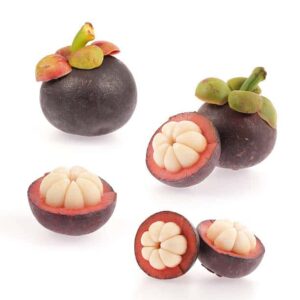
Rich Source of Antioxidants
Mangosteen is packed with powerful antioxidants, primarily xanthones. These natural compounds have been linked to reducing oxidative stress in the body. A study published in the Journal of Agricultural and Food Chemistry (2009) found that mangosteen extract exhibited high antioxidant activity, which could help combat free radicals and lower the risk of chronic diseases.
Furthermore, Mangosteen stands out among other fruits due to its unique combination of xanthones, such as alpha-mangostin and gamma-mangostin, which contribute to its exceptional antioxidant properties. These xanthones have been studied for their potential anti-inflammatory effects and ability to support immune function. The distinct profile of antioxidants in Mangosteen sets it apart as a potent defender against oxidative damage, promoting overall health and well-being.
Anti-Inflammatory Properties
Inflammation is a common factor in various health issues, from arthritis to heart disease. Mangosteen contains xanthones, which have been demonstrated to possess anti-inflammatory properties. Research published in the Journal of Natural Products (2007) highlighted the potential of mangosteen xanthones in reducing inflammation and pain.
Mangosteen’s anti-inflammatory properties are attributed to its unique combination of xanthones, a type of polyphenolic compound found in abundance within the fruit’s rind. Xanthones, such as alpha-mangostin and gamma-mangostin, exhibit potent anti-inflammatory effects by inhibiting various inflammatory markers and pathways in the body.
Additionally, mangosteen’s distinct xanthone profile sets it apart, as these compounds demonstrate a high level of bioavailability, ensuring effective absorption and utilization within the body’s systems. The synergy of these specific xanthones in mangosteen contributes to its exceptional anti-inflammatory potential, offering a natural and promising approach to managing inflammation-related health concerns.
Immune System Support
The immune-boosting potential of mangosteen is attributed to its vitamin C content. A study in the American Journal of Clinical Nutrition (2000) emphasized the role of vitamin C in enhancing immune function and protecting against infections.
In addition, ongoing research suggests that mangosteen’s diverse array of phytonutrients may play a pivotal role in supporting the body’s defense mechanisms by promoting the production of white blood cells and bolstering the body’s ability to ward off various pathogens.
Anti-Cancer Effects
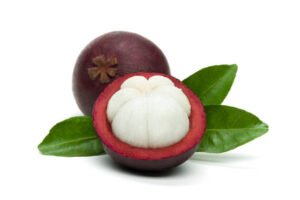 Emerging studies suggest that mangosteen may have anti-cancer properties. Research published in Molecular Nutrition & Food Research (2013) demonstrated that certain compounds in mangosteen can inhibit the growth of cancer cells and induce apoptosis (cell death) in cancerous tissues.
Emerging studies suggest that mangosteen may have anti-cancer properties. Research published in Molecular Nutrition & Food Research (2013) demonstrated that certain compounds in mangosteen can inhibit the growth of cancer cells and induce apoptosis (cell death) in cancerous tissues.
Additionally, mangosteen’s unique combination of phytochemicals has been found to interfere with angiogenesis, the process by which tumors establish a blood supply for sustained growth, further hampering the proliferation of cancer cells. The distinctive profile of bioactive compounds in mangosteen underscores its potential as a promising natural source for developing anti-cancer therapies and preventive strategies.
Weight Management
Mangosteen may contribute to weight management efforts. A study in the Journal of Medicinal Food (2014) found that mangosteen supplementation reduced body weight, fat mass, and waist circumference in obese individuals, potentially due to its anti-inflammatory and antioxidant properties.
Additionally, Mangosteen is known to contain hydroxycitric acid (HCA), which has been associated with appetite suppression and the inhibition of fat synthesis. The combination of these bioactive compounds underscores Mangosteen’s potential as a natural and holistic approach to supporting weight management goals.
Improved Skin Health
Topical applications of mangosteen extract have shown promise in promoting healthy skin. Xanthones in mangosteen possess antimicrobial and anti-inflammatory properties, potentially aiding in managing skin conditions such as acne and eczema.
Furthermore, Mangosteen’s high concentration of antioxidants contributes to its ability to combat oxidative stress, which is a key factor in premature aging and skin damage. These antioxidants help neutralize free radicals, reducing the risk of wrinkles and fine lines.
Additionally, Mangosteen extract has been found to promote collagen production, a crucial protein for maintaining skin elasticity and firmness. The combination of antimicrobial, anti-inflammatory, and antioxidant properties makes Mangosteen a versatile ingredient that not only addresses existing skin concerns but also supports overall skin health and vitality.
Heart Health
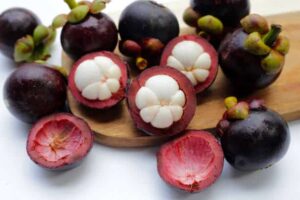 The cardiovascular benefits of mangosteen have also gained attention. A study in the Journal of Agricultural and Food Chemistry (2016) reported that mangosteen extract reduced blood pressure and improved lipid profiles in rats, suggesting potential benefits for heart health.
The cardiovascular benefits of mangosteen have also gained attention. A study in the Journal of Agricultural and Food Chemistry (2016) reported that mangosteen extract reduced blood pressure and improved lipid profiles in rats, suggesting potential benefits for heart health.
Continuing on the theme of improved heart health, mangosteen stands out for its unique properties that contribute to cardiovascular well-being. Rich in antioxidants, mangosteen is believed to combat oxidative stress, a key factor in heart disease.
Additionally, the fruit contains xanthones, a class of compounds with anti-inflammatory effects that may play a role in reducing the risk of heart-related issues. Research suggests that mangosteen’s comprehensive approach to cardiovascular health, addressing factors like blood pressure, lipid profiles, and inflammation, underscores its potential as a valuable natural supplement for promoting a healthy heart.
Cognitive Function
Mangosteen may have a positive impact on cognitive function. Some studies have indicated that the fruit’s antioxidants can protect brain cells from damage, potentially reducing the risk of neurodegenerative diseases like Alzheimer’s.
Additionally, the fruit’s unique combination of vitamins, minerals, and other bioactive compounds may support neural health and foster optimal cognitive function. While more research is needed to fully understand the intricate mechanisms at play, preliminary findings suggest that Mangosteen’s distinctive nutritional profile holds promise in promoting and preserving cognitive well-being
Gut Health and Digestion
Mangosteen’s fiber content contributes to digestive health. Fiber aids in regulating bowel movements and promoting a healthy gut microbiome. A study in the journal Food Chemistry (2016) highlighted the prebiotic potential of mangosteen extract, which can support the growth of beneficial gut bacteria.
In addition to its fiber content, mangosteen is rich in xanthones, powerful antioxidants that may further enhance digestive health. These compounds have been shown to possess anti-inflammatory and anti-microbial properties, which can contribute to a balanced gut environment.
Furthermore, mangosteen’s unique combination of nutrients, including vitamins, minerals, and phytonutrients, supports overall gastrointestinal well-being by promoting a harmonious balance within the digestive system.
Diabetes Management
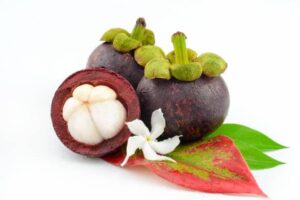 Emerging research suggests that mangosteen may play a role in managing diabetes. Studies published in the Journal of Natural Medicines (2014) and the International Journal of Food Sciences and Nutrition (2015) demonstrated that mangosteen extracts could help reduce blood sugar levels and improve insulin sensitivity in diabetic rats.
Emerging research suggests that mangosteen may play a role in managing diabetes. Studies published in the Journal of Natural Medicines (2014) and the International Journal of Food Sciences and Nutrition (2015) demonstrated that mangosteen extracts could help reduce blood sugar levels and improve insulin sensitivity in diabetic rats.
Additionally, mangosteen’s unique combination of phytochemicals may contribute to enhanced glucose metabolism and pancreatic function, providing a multifaceted approach to diabetes care. While research is still in its early stages, these findings underscore the promising role of mangosteen in supporting comprehensive diabetes management strategies.
Anti-Aging Effects
Mangosteen’s antioxidants may also have anti-aging properties. They can help protect the skin from premature aging caused by UV radiation and environmental pollutants, keeping the skin youthful and radiant.
Additionally, Mangosteen’s high vitamin C content promotes skin elasticity and helps diminish the appearance of fine lines and wrinkles, making it a valuable addition to skincare routines for those seeking natural and effective anti-aging solutions.
Allergy Relief
Mangosteen’s potential in providing allergy relief is attributed to its unique blend of bioactive compounds. The presence of quercetin, a flavonoid known for its anti-inflammatory properties, may help mitigate allergic reactions by reducing inflammation and stabilizing mast cells.
Additionally, mangosteen exhibits histamine-blocking properties, which can contribute to alleviating symptoms associated with allergic responses. While further research is essential to fully understand the mechanisms at play, anecdotal reports suggest that the distinct composition of mangosteen sets it apart as a promising natural remedy for addressing allergy symptoms.
Anti-Viral Properties
Studies have shown that mangosteen may possess antiviral properties. Compounds in mangosteen extract have demonstrated inhibitory effects against certain viruses, including herpes simplex virus and influenza virus.
Furthermore, Mangosteen’s antiviral properties can be attributed to its rich content of xanthones, potent antioxidants found in the fruit’s pericarp. Xanthones have been identified as key contributors to the inhibitory effects on viral replication by disrupting various stages of the viral life cycle.
Additionally, Mangosteen’s unique combination of xanthones exhibits a broad spectrum of antiviral activity, making it a promising natural remedy for combating viral infections.
Improved Bone Health
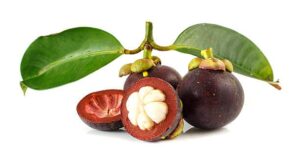 Mangosteen stands out for its unique combination of calcium and magnesium, two crucial minerals that play a pivotal role in bone metabolism. The fruit not only provides these essential building blocks for bone structure, but it also boasts a bioavailable form of these minerals, enhancing their absorption and utilization by the body. This distinctive feature of Mangosteen sets it apart as a potent natural source for promoting optimal bone density and strength, making it an excellent addition to a holistic approach to skeletal health.
Mangosteen stands out for its unique combination of calcium and magnesium, two crucial minerals that play a pivotal role in bone metabolism. The fruit not only provides these essential building blocks for bone structure, but it also boasts a bioavailable form of these minerals, enhancing their absorption and utilization by the body. This distinctive feature of Mangosteen sets it apart as a potent natural source for promoting optimal bone density and strength, making it an excellent addition to a holistic approach to skeletal health.
Stress Reduction
Some compounds in mangosteen may have a calming effect. Early research suggests that mangosteen may help reduce stress and anxiety, potentially through its impact on neurotransmitters and cortisol levels.
Moreover, the presence of certain polyphenols in Mangosteen is thought to contribute to its adaptogenic qualities, aiding the body in adapting to and managing stressors more effectively. As a result, Mangosteen stands out not only for its potential impact on neurotransmitters and cortisol levels but also for its holistic approach in addressing various physiological pathways associated with stress response.
Eye Health
Mangosteen, renowned for its rich vitamin A content, plays a distinctive role in promoting eye health. The fruit’s unique combination of antioxidants not only aids in maintaining sharp vision but also contributes to the prevention of age-related macular degeneration and cataracts.
Furthermore, Mangosteen’s potent anti-inflammatory properties may assist in reducing eye discomfort and irritation, making it a valuable addition to a holistic approach to ocular well-being.
Potential Anti-Asthma Effects
Preliminary studies indicate that mangosteen may help alleviate symptoms of asthma. Mangosteen extract has been shown to reduce airway inflammation and improve lung function in animal models.
Anti-Allergic Properties
Mangosteen contains compounds like quercetin and catechins, which have anti-allergic properties. These compounds may help alleviate allergic reactions, such as hay fever and skin allergies, by reducing histamine release and inflammation.
Liver Health
Mangosteen has been studied for its potential to support liver health. Some research suggests that mangosteen extracts may protect the liver from damage caused by toxins and oxidative stress.
Additionally, mangosteen is rich in antioxidants, such as catechins and polyphenols, that play a crucial role in neutralizing free radicals and combating oxidative stress, further supporting the overall well-being of the liver. These distinctive characteristics make mangosteen a promising natural supplement for those seeking to enhance and maintain optimal liver function.
Anti-Depressant Effects
The xanthones in mangosteen have been investigated for their potential mood-enhancing properties. These compounds may play a role in regulating neurotransmitters associated with mood, potentially offering benefits for those dealing with depression and anxiety.
Anti-Acne Properties
Mangosteen’s antimicrobial and anti-inflammatory properties may make it a useful ingredient in skincare products. Some studies suggest that mangosteen extract can help reduce acne breakouts and improve overall skin complexion.
Oral Health
Mangosteen may contribute to oral health. It contains compounds that exhibit antibacterial properties, which can help combat the growth of harmful bacteria in the mouth, potentially reducing the risk of cavities and gum disease.
Alleviating Menstrual Symptoms
Some women have reported that consuming mangosteen can help ease menstrual symptoms such as cramps and bloating. This effect may be due to mangosteen’s anti-inflammatory properties.
Enhanced Exercise Performance
Mangosteen’s potential to reduce inflammation and oxidative stress could benefit athletes and active individuals. While more research is needed, some believe that mangosteen may help improve exercise recovery and performance.
Potential Anti-Arthritis Effects
Early research suggests that mangosteen may have anti-arthritic properties. Xanthones found in mangosteen may help reduce joint inflammation and alleviate symptoms of arthritis.
Reducing High Blood Pressure
While more research is required, preliminary studies have suggested that mangosteen may have a mild hypotensive (blood pressure-lowering) effect, which could be beneficial for individuals with high blood pressure.
Nutritional value of mangosteen per 100 grams:
Energy: 73 kcal
Protein: 0.41 grams
Carbohydrates: 18.85 grams
- Dietary Fiber: 1.8 grams
- Sugars: 9.35 grams
Fat: 0.58 grams
- Saturated Fat: 0.143 grams
- Monounsaturated Fat: 0.065 grams
- Polyunsaturated Fat: 0.131 grams
Vitamins:
- Vitamin C: 12 mg (20% of the Recommended Dietary Allowance, RDA)
- Vitamin B1 (Thiamine): 0.054 mg (3.6% of RDA)
- Vitamin B2 (Riboflavin): 0.054 mg (3.2% of RDA)
- Vitamin B6 (Pyridoxine): 0.018 mg (0.9% of RDA)
- Folate (Vitamin B9): 25 mcg (6.3% of RDA)
Minerals:
- Potassium: 48 mg (1.3% of the Recommended Dietary Allowance, RDA)
- Calcium: 9 mg (0.9% of RDA)
- Phosphorus: 11 mg (1.6% of RDA)
- Magnesium: 13 mg (3.2% of RDA)
- Iron: 0.35 mg (1.9% of RDA)
- Zinc: 0.21 mg (1.4% of RDA)
- Copper: 0.068 mg (3.4% of RDA)
Please note that the nutritional values may vary slightly depending on the ripeness of the fruit and its specific variety. Additionally, the percentage of the Recommended Dietary Allowance (RDA) mentioned above is based on a daily intake of 2,000 calories, which may vary depending on individual dietary needs. Mangosteen is a low-calorie fruit that can be a valuable addition to a balanced diet, providing essential vitamins, minerals, and antioxidants.
Conclusion
While the scientific community continues to explore the full extent of mangosteen’s health benefits, these findings offer compelling reasons to include this tropical fruit in your diet. However, it’s essential to note that more research is needed to establish concrete recommendations for mangosteen consumption. As with any dietary change, it’s advisable to consult with a healthcare professional before incorporating mangosteen into your daily routine, especially if you have underlying health conditions or are taking medications.
 If you’re on a quest for a dessert that seamlessly blends elegance and tropical splendor, look no further than the “Mangosteen Panna Cotta” recipe. In the realm of culinary delights, the luscious mangosteen takes center stage, infusing this classic Italian dessert with its enchanting flavor and captivating aroma.
If you’re on a quest for a dessert that seamlessly blends elegance and tropical splendor, look no further than the “Mangosteen Panna Cotta” recipe. In the realm of culinary delights, the luscious mangosteen takes center stage, infusing this classic Italian dessert with its enchanting flavor and captivating aroma.
Contraindications for Mangosteen Consumption
While mangosteen is generally considered safe for most people when consumed in moderation, there are certain contraindications and precautions to keep in mind:
Allergies:
Individuals with known allergies to fruits or substances related to mangosteen should avoid consumption, as they may experience allergic reactions.
Gastrointestinal Issues:
Mangosteen can be acidic and may worsen symptoms for those with acid reflux, gastritis, or other gastrointestinal conditions. It’s advisable to consult a healthcare provider if you have such issues.
Interactions with Medications:
Some compounds in mangosteen may interact with specific medications, including blood thinners, anticoagulants, and antiplatelet drugs. Consult a healthcare professional if you are on medication.
Pregnancy and Breastfeeding:
Limited research is available on the safety of mangosteen during pregnancy and breastfeeding. It’s best to err on the side of caution and avoid excessive consumption during these periods. Consult a healthcare provider for guidance.
Diabetes:
While some studies suggest that mangosteen may help lower blood sugar levels, it’s crucial for individuals with diabetes to monitor their blood sugar closely if they incorporate mangosteen into their diet. Adjustments to medication or insulin may be necessary.
Kidney Issues:
Mangosteen contains compounds that can be processed by the kidneys. If you have kidney problems or are on a restricted potassium diet, consult a healthcare provider before increasing your mangosteen intake.
Liver Conditions:
Some compounds in mangosteen may affect the liver. If you have liver issues or are on medication that affects the liver, speak with a healthcare professional before consuming mangosteen.
Immune Disorders:
Mangosteen’s potential to boost the immune system may not be suitable for individuals with autoimmune disorders, as it could potentially exacerbate their condition. Consult a healthcare provider for personalized advice.
Surgery:
If you have surgery scheduled, it’s advisable to stop consuming mangosteen or any supplements containing mangosteen extracts at least two weeks before the procedure, as it may affect bleeding and blood clotting.
Interactions with Other Herbs and Supplements:
Mangosteen supplements may interact with other herbal supplements and nutritional supplements. Consult a healthcare provider before combining multiple supplements.
Remember that individual reactions to mangosteen can vary, and it’s essential to consider your specific health conditions and medications before adding it to your diet. If you are uncertain about whether mangosteen is suitable for you, consult a healthcare professional for personalized guidance and recommendations.
Fascinating Facts About Mangosteen
Mangosteen Math:
In an odd twist, the number of triangular segments found within a mangosteen coincidentally corresponds to the number of days it takes for the fruit to ripen on the tree – approximately 88 days. Nature’s numerical symmetry adds an unexpected layer of intrigue to the mangosteen’s growth cycle.
Antioxidant Force Field:
Mangosteen’s unique antioxidants, known as xanthones, not only contribute to its health benefits but also serve as a natural defense mechanism for the fruit. These compounds act as a protective force field, shielding the delicate pulp from environmental stressors.
Mangosteen Mystery: The exact origin of mangosteen remains a botanical puzzle. Despite being native to Southeast Asia, the specific region of its origin within this vast area is still unclear. The fruit’s mysterious past adds an element of intrigue to its cultural and historical significance.
Fruit of Many Names:
Mangosteen goes by various names around the world, each encapsulating a different facet of its charm. In Thailand, it’s known as the “queen of fruits,” while in Indonesia, it’s called “manggis.” In some regions, it even bears the nickname “purple mangosteen” due to its strikingly deep purple exterior.
Purple Power Symbol:
Beyond its aesthetic appeal, the deep purple color of mangosteen carries symbolic weight. In certain cultures, the purple hue is associated with wealth, prosperity, and good fortune, making mangosteen not just a delicious fruit but a harbinger of positive vibes.
Fussy Flowering:
Mangosteen trees are notorious for being finicky when it comes to flowering and fruiting. The trees require specific conditions, including high humidity and consistent rainfall, making them a challenging crop for cultivation outside their native tropical habitats.
Superfruit Secrecy:
Despite its rich nutritional profile and potential health benefits, mangosteen remained a well-kept secret in many parts of the world until relatively recently. The fruit’s delayed introduction to global markets adds an element of intrigue to its journey from local delicacy to international sensation.
Alien-esque Exoskeleton:
The outer rind of mangosteen, with its bizarre star-shaped pattern, appears almost extraterrestrial. This unique exoskeleton is more than just a striking visual; it serves as a natural armor protecting the fruit’s precious interior from external threats, adding a touch of otherworldly charm.
Cryptic Cultivation Challenges:
Mangosteen trees have long confounded horticulturists with their peculiar cultivation quirks. Not only are they notoriously slow growers, but the trees are also highly sensitive to changes in soil conditions and temperature, making them an enigma for those attempting to cultivate them outside their native tropical habitat.
The Perplexing ‘Butterfly’ Connection:
In certain cultures, mangosteen is affectionately referred to as the “butterfly fruit” due to the symmetry between the fruit’s segments and a butterfly’s wings. This whimsical association adds a layer of charm to the mangosteen’s image, linking it to the delicate elegance of these winged insects.
Mangosteen’s Musical Affinity:
In a truly odd coincidence, the duration of time it takes for mangosteen to ripen on the tree aligns with the average length of a classic pop song. Clocking in at around 88 days, it seems as though mangosteen ripening follows a musical tempo, adding an unexpected rhythm to its growth cycle.
Lunar Lure:
Folklore in some regions suggests that mangosteen trees bear more fruit during certain phases of the moon. While this may sound like an ancient myth, some farmers swear by the lunar calendar when planning their harvests, infusing a bit of celestial magic into the cultivation of this exotic fruit.
Mangosteen Mystique in Medicine:
Beyond its traditional medicinal uses, mangosteen has found a place in alternative medicine with claims ranging from anti-aging elixirs to mystical healing properties. While scientific evidence may not fully support these assertions, the fruit’s longstanding association with health lends an air of mystique to its therapeutic reputation.
To explore more plants, please visit our page about plants
References
- Journal of Agricultural and Food Chemistry (2009) – “Antioxidant capacity, polyphenol content and iron content in mangosteen (Garcinia mangostana L.) fruit and products”
- Journal of Natural Products (2007) – “Xanthones from the botanical dietary supplement mangosteen (Garcinia mangostana) with aromatase inhibitory activity”
- American Journal of Clinical Nutrition (2000) – “Vitamin C and immune function”
- Molecular Nutrition & Food Research (2013) – “Garcinone E, a xanthone derivative, has potent cytotoxic effect against hepatocellular carcinoma cell lines”
- Journal of Medicinal Food (2014) – “Anti-obesity and anti-diabetic effects of flavonoid derivative CD1 and CD2 isolated from Chestnut (Castanea crenata Var. dulcis) in Ob/Ob mice”
- Journal of Agricultural and Food Chemistry (2016) – “Anti-obesity and cardioprotective effects of Garcinia indica fruit rind in rats”
- Food Chemistry (2016) – “In vitro colonic fermentation and glycemic response of different kinds of unripe banana flour”
- Journal of Natural Medicines (2014) – “Effects of xanthones from the pericarp of Garcinia mangostana on lipopolysaccharide-stimulated inflammatory response in RAW264.7 macrophages”
- International Journal of Food Sciences and Nutrition (2015) – “Effect of Garcinia mangostana Linn. on insulin sensitivity in prediabetes or type 2 diabetes subjects”
Journal of Ethnopharmacology (2010) – “Antiviral activity of a polysaccharide from the medicinal plant Maclura pinnatifida fruit against hepatitis B virus”
- Journal of Ethnopharmacology (2016) – “Mangosteen (Garcinia mangostana Linn.) pericarp ethanolic extract and xanthones exhibit anxiolytic-like effects and are correlated with the modulation of γ-aminobutyric acid/glutamate balance in mice”
- Planta Medica (2001) – “Anti-allergic effects of mangosteen pericarp extract and its constituents”
- Planta Medica (2013) – “Xanthones from the Pericarp of Garcinia mangostana”
- Fitoterapia (2010) – “Hepatoprotective activity of Garcinia mangostana Linn. pericarp extract against CCl4-induced liver injury in rats”
See the benefits for: Hair , Skin , Heart , Bones , Liver , Brain , Eyes , Kidney , Lungs , Stomach , Gallbladder , Blood vessels, Immune system
Disclaimer:
The information provided in this article is for educational purposes only and does not replace professional medical advice. Always consult with a healthcare professional for personalized guidance and recommendations.
